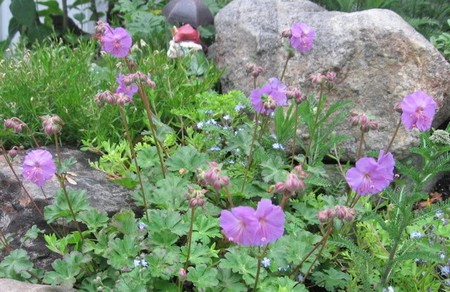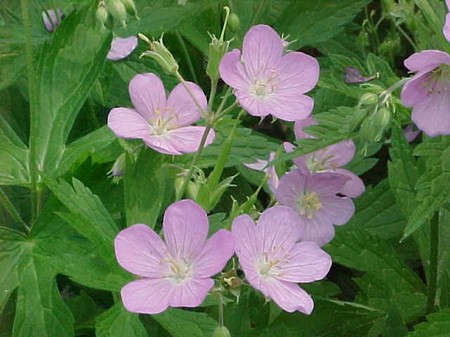There are many different varieties of wild geranium. American cranesbill is an attractive hardy perennial with rose-purple flowers and mottled leaves, found growing wild in woodlands throughout North America. In England and Europe the best known wild geranium is herb Robert, also known as stinking cranesbill because of its unpleasant smell, to he-found growing in woods and open ground, even in cracks in walls and steps.
The name cranesbill was inspired by the beak-shaped fruit of the plant which resembles the bill of a crane. It also derives from the Greek wordgeranos meaning crane. For relatives of American cranesbill and herb Robert in the geranium family, the French botanist, L’Herifer, coined the names Erodium from en dios meaning heron and Pelargonium from pelaigos meaning stork. Our non-hardy garden geranium came from the South African species of Pelargonium and was introduced into Europe in the 17th century. They became increasingly popular because of the brightness of their flowers and varieties of colour so that by Victorian times they were found in almost every summer garden. They were also greatly appreciated for the beautiful scents from their leaves which varies from one species to another, from almond to lemon, nutmeg and rose.
According to an old Arab legend, geraniums are descended from the mallow. Once the prophet Mohammed washed his shirt in a stream and hung it out on a mallow plant to dry in the sun. The humble-mallow blushed at so great an honour and turned a deep shade of pink and was thus transformed into the magnificent geranium.
Herb Robert was named after a Frenchman, the Abbe Robert, who founded the Cistercian order in the 11th century; perhaps this is why in the language of flowers, geranium means steadfast piety. In the language of love it means constancy and availability. However, to dream of geraniums was taken to mean a change of interests. In medieval times geranium was used as a protective herb to ward oft evil influences and ill-health. According to Culpeper, it was under the dominion of Venus, and in his time it was a symbol of love and the desire to please. The flowers were used in love potions, and also as a cordial to lift the spirits and comfort the heart.
Herbal remedy
The wild geraniums, American cranesbill and herb Robert, are both powerful astringents due to the high percentage of tannins they contain. This makes them very useful for diarrhoea and dysentery, any kind of internal bleeding and heavy periods, and externally to heal cuts and wounds, ulcers and sores. American cranesbill was well known among the native-Americans and early settlers for its healing properties. The Blackfoot Indians kept the powdered root in their pouches as a first aid remedy for stopping bleeding from cuts and wounds; the Meskwakis of the mid-west used the root to heal sore gums, pyorrhoea, for toothache and piles; the Cherokees made a mouthwash from a decoction of the root and used it for thrush in children while the Iroquois treated sore throats, mouth ulcers and infections, sores on the skin with cranesbill and used it for babies’ navels when they did not heal. The early settlers boiled the root in milk and made a popular remedy for children’s bowel problems including diarrhoea and dysentery since cranesbill tasted pleasant and had a gentle action with no adverse effects.
Both herb Robert and American cranesbill can betaken to astringe flaccid muscles, causing problems such as stress incontinence, prolapse and constipation, and also to dry up excess secretions as in catarrh and vaginal discharge. When used as a wash on the skin they can be used not only for cuts and grazes, sores and ulcers but also burns, greasy-skin and blocked pores that cause pimples. They have also been used as a wash for the nipples when they become sore and tender (not on the whole-breast as this may dry up breasttnilk).
Homeopathic remedy: G. maculatum
Geranium maculatum root is also used for diarrhoea, dysentery, heavy periods, haemorrhages, ulcers, sore-nipples, vaginal discharges and sore throats. Other symptoms indicating its homeopathic use are giddiness with double vision, relieved by closing the eyes and lying down, dilated pupils, difficulty walking with the eyes open, though better with them closed, dryness of the mouth, burning at the tip of the tongue, pain on left side of forehead, and a constant desire to empty the bowels but inability to do so. There may be symptoms indicating stomach ulcers including vomiting of blood.
Aromatherapy oil
Rose geranium, Pelargonium graveolens, is a relative of the cranesbills, and is used for its rosy sweet smell. It has a beneficial effect on the nervous system, and has astringent properties. Rose geranium is ideal for stress-related disorders such as headaches, stomach aches, menstrual cramps and debility. It helps to relieve tension and anxiety, and lifts the spirits, dispelling melancholy and depression. Its balancing effect on the emotions reduces mood swings and can be put to good effect when treating PMS and menopausal problems. Its hormone-regulating properties are very helpful in this respect.
As an astringent rose geranium will tone up lax muscles, relieve diarrhoea and heavy periods, stop bleeding from grazes and cuts, and is good used as a skin toner for excess sebum production, spots, greasy skin and acne. It can also be used in washes for piles, varicose veins, chilblains, burns and cellulite, and skin complaints such as eczema. Its antiseptic properties help prevent infections from cuts and can be used when treating boils, abscesses and head lice. It also makes a good insect repellent and deodorant. Used on the breasts, geranium reduces swelling and engorgement, and makes a good remedy to prevent and treat mastitis.
The flower essence
Geranium is for those who feel down and depressed, lacking colour in their life. Geranium helps to lift the spirits and to bring joy and happiness to your daily activities. It is also helpful for those who need strength and motivation to bring plans and projects into action. It helps to get things started in a well ordered way by providing the energy and clarity that is needed.

